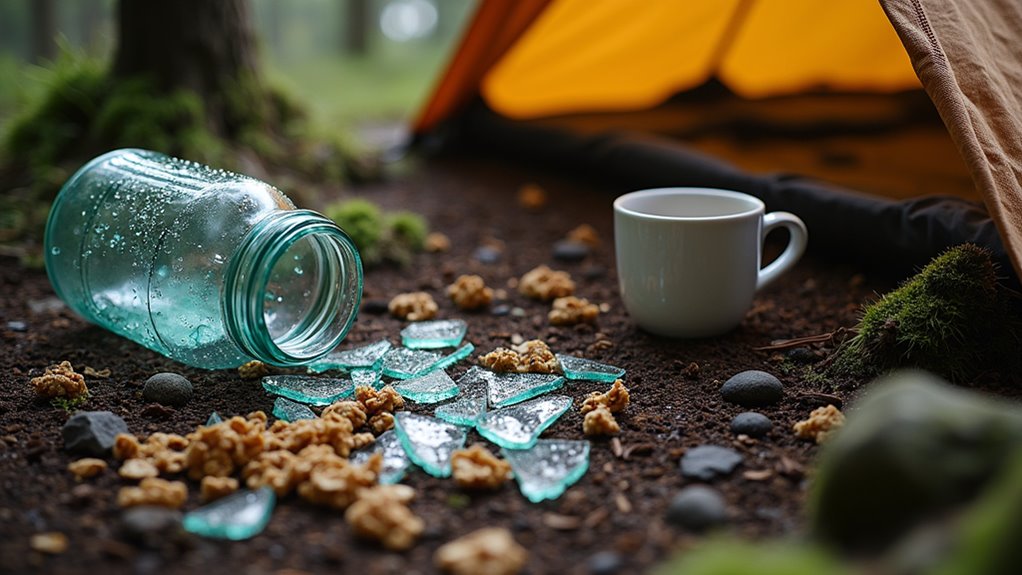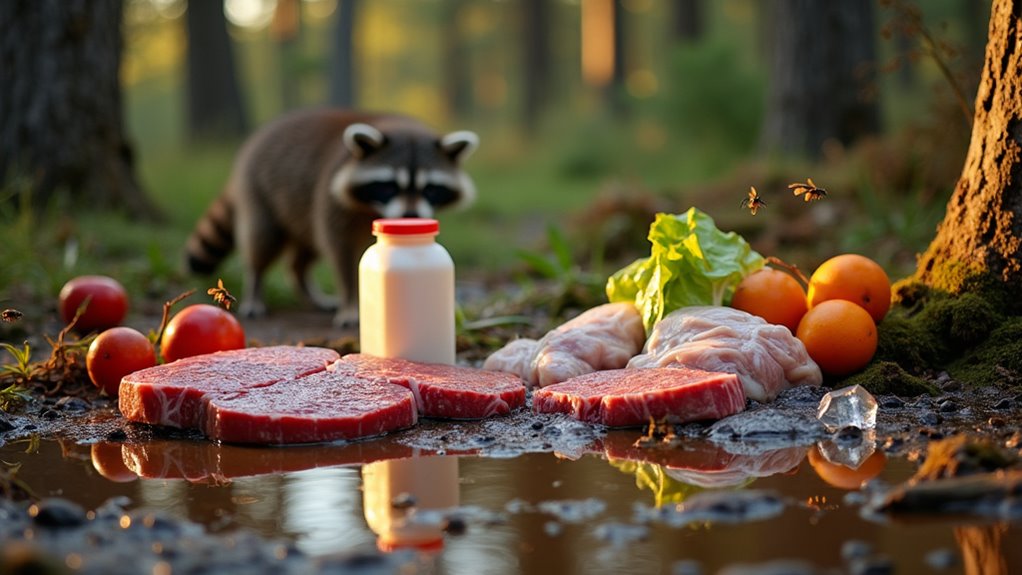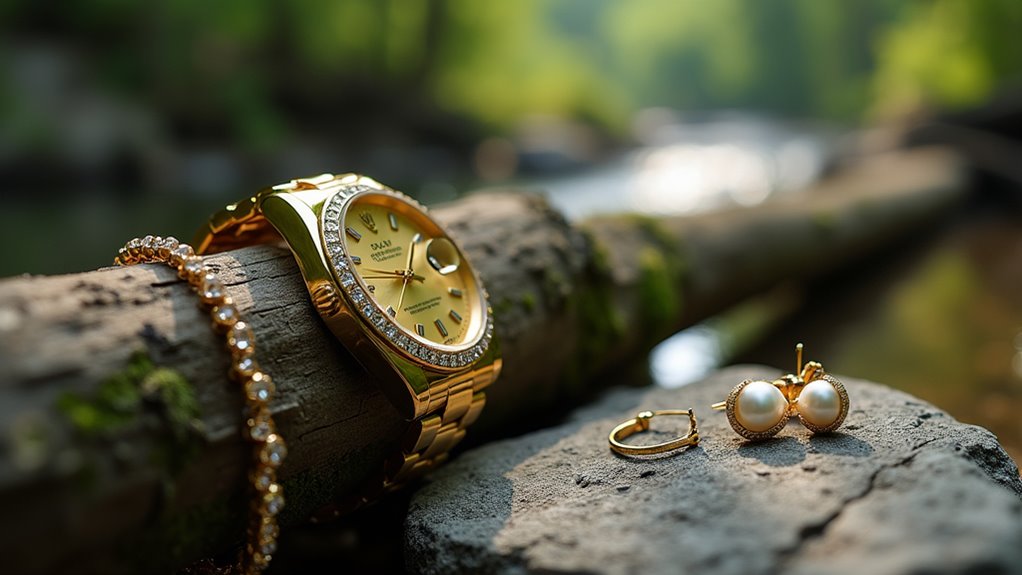Physical Address
304 North Cardinal St.
Dorchester Center, MA 02124
Physical Address
304 North Cardinal St.
Dorchester Center, MA 02124

Mistakes in packing can turn your camping adventure into a dangerous disaster—discover which eight seemingly essential items should never make it into your backpack.
Like the mythical traveler who carried the weight of the world, you might be tempted to pack everything but the kitchen sink for your camping adventure. However, bringing the wrong items can quickly turn your budget-friendly getaway into an expensive disaster or safety hazard. Some seemingly essential gear will actually work against you in the wilderness, creating unnecessary risks and complications. Before you zip up that overstuffed backpack, you’ll want to know which eight items should stay home.

When you’re packing for your camping adventure, leave the glass containers at home and opt for lightweight plastic or metal alternatives instead. Glass bottles and jars create unnecessary weight in your backpack and pose serious safety risks if they break.
Ditch heavy glass containers when camping—lightweight plastic or metal alternatives eliminate breakage risks and reduce pack weight significantly.
Imagine dealing with shattered glass around your campsite where you’re walking barefoot or in the dark—it’s a recipe for cuts and injuries.
Broken glass also creates environmental hazards that can harm wildlife and other campers long after you’ve left. Plus, you’ll waste valuable time cleaning up instead of enjoying nature.
This principle becomes even more critical when desert hiking, where medical help may be hours away and every ounce in your pack matters for survival.
Choose durable BPA-free plastic containers, silicone food storage bags, or lightweight aluminum bottles. These alternatives cost less to replace if lost, won’t add extra weight, and eliminate the stress of protecting fragile items during your outdoor adventure.
Although cotton feels comfortable in everyday life, it’s one of the worst fabric choices you can make for camping. Cotton absorbs moisture like a sponge and takes forever to dry, leaving you cold and miserable when you sweat or get caught in rain. Wet cotton loses all insulating properties and can actually cause hypothermia in cool conditions.
Jeans are particularly problematic because they’re heavy, restrictive, and become uncomfortable once damp. They’ll weigh you down and chafe during hikes.
Instead, pack synthetic fabrics or merino wool that wick moisture away from your skin and dry quickly. You don’t need expensive gear – affordable polyester hiking pants and moisture-wicking shirts from discount retailers work perfectly. Your comfort and safety depend on staying dry.
Choosing the right clothing is essential for enjoying camping activities that make your outdoor adventure both comfortable and memorable.

While technology can enhance your outdoor experience, bringing too many electronics turns your camping trip into a logistical nightmare. You’ll spend more time managing chargers, cables, and batteries than enjoying nature’s beauty.
Consider what happens when you overpack gadgets:
Overpacking electronics transforms your peaceful nature escape into a stressful tech management headache that defeats camping’s entire purpose.
Keep it simple. Pack one reliable device with backup power, waterproof protection, and essential apps downloaded offline. Your wallet and sanity will thank you.
Instead of cluttering your backpack with unnecessary gadgets, invest in proper camping storage solutions that help organize the essential gear you actually need for a successful outdoor adventure.
That vanilla-scented shampoo and fruity body wash you love at home become dangerous magnets for wildlife in the wilderness. Bears, raccoons, and other animals associate sweet smells with food sources, potentially drawing them straight to your campsite.
You don’t need to sacrifice hygiene entirely. Pack unscented alternatives like castile soap, which works for both body and hair washing.
Biodegradable, fragrance-free options cost roughly the same as regular products but won’t attract unwanted visitors.
Store all toiletries in bear-proof containers or hang them with your food, even unscented items. That coconut-scented sunscreen and minty toothpaste also qualify as attractants.
Your safety’s worth more than smelling like a tropical paradise. Save the fancy products for post-camping showers at home. These fragranced products also act as mosquito magnets, making your camping experience even more uncomfortable with constant buzzing and biting.

Unless you’re car camping with a high-quality cooler and plenty of ice, fresh meat becomes a food safety nightmare within hours. You’ll risk serious foodborne illness when temperatures climb above 40°F for more than two hours.
Instead of gambling with your health and wallet, consider these smart alternatives:
These safer protein options will help ensure your family camping adventure remains enjoyable rather than turning into a medical emergency.
Save fresh steaks for your backyard grill. Your stomach and budget will thank you when you’re not dealing with spoiled food or emergency room visits.
Although cast iron skillets work beautifully at home, they’ll turn your backpack into a torture device on the trail. A typical 10-inch cast iron pan weighs around 5 pounds – that’s equivalent to carrying five water bottles just for one cooking item. When you’re hiking miles with everything on your back, every ounce matters.
Cast iron also requires seasoning maintenance and rust prevention, making it high-maintenance for outdoor conditions. Instead, invest in lightweight aluminum or titanium cookware that weighs under a pound.
Non-stick camping pans cost $15-30 and perform just as well without destroying your shoulders. You’ll cook the same meals while actually enjoying the hike to your campsite. If you’re traveling in an RV instead of backpacking, proper hurricane preparation includes securing heavy cookware to prevent it from becoming dangerous projectiles during severe weather.

While you might feel naked without your favorite watch or wedding ring, bringing expensive jewelry and valuables camping creates unnecessary stress and risk. You’ll constantly worry about losing or damaging items in dirt, water, or rough terrain. Plus, theft can happen even at campsites.
Expensive jewelry and camping don’t mix—save yourself the stress and leave valuables safely at home where they belong.
Leave these items safely at home:
Focus on enjoying nature’s beauty instead of protecting your bling. If you’re planning water activities during your camping trip, consider whether renting equipment might be a better option than bringing your own expensive gear that could be damaged or lost.
Speaking of things that can cause stress and danger, fireworks and flammable materials top the list of items you should never pack for camping. You’re dealing with dry conditions, wildlife, and other campers who won’t appreciate unexpected explosions or fires.
Most campgrounds strictly prohibit fireworks, and you’ll face hefty fines or ejection if caught. Beyond legal troubles, you’re risking serious accidents that could destroy natural habitats and endanger lives.
Skip packing extra gasoline, propane canisters beyond what you need, or any explosive materials. Even sparklers can ignite surrounding vegetation faster than you’d expect.
Instead, enjoy nature’s own entertainment – stargazing, campfire stories, and wildlife watching. These free activities won’t land you in legal trouble or harm the environment you came to enjoy.
For your morning caffeine fix, consider safe alternatives like a portable espresso maker that doesn’t require open flames or large amounts of flammable fuel.
You’ll save money and hassle by leaving these items behind. Take Sarah’s experience: she packed her grandmother’s jewelry and expensive camera gear for a weekend trip. After her tent was broken into, she lost $2,000 worth of valuables. Don’t make her mistake. Stick to camping essentials, choose practical gear over fancy items, and you’ll enjoy your outdoor adventure without worrying about theft, damage, or unnecessary weight slowing you down.